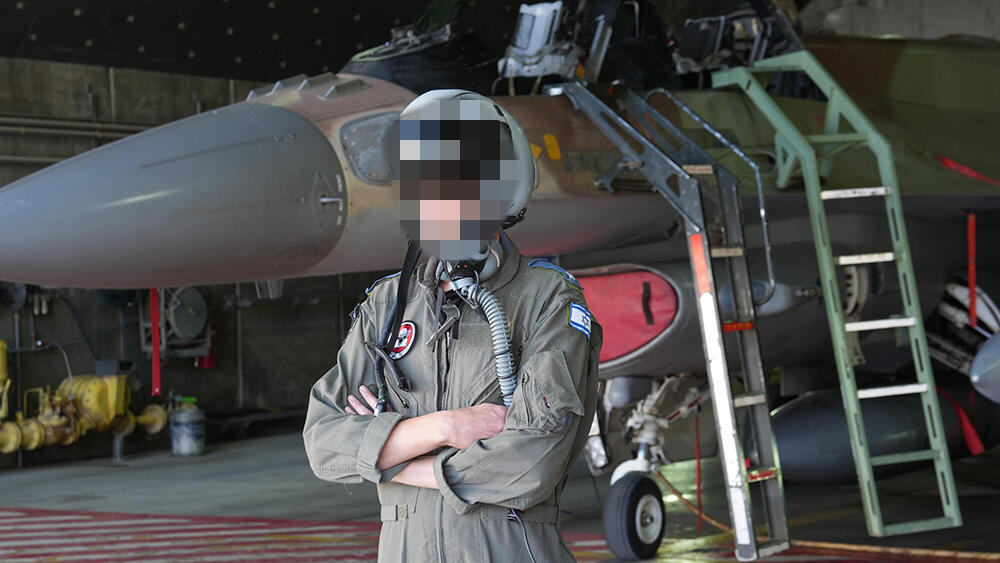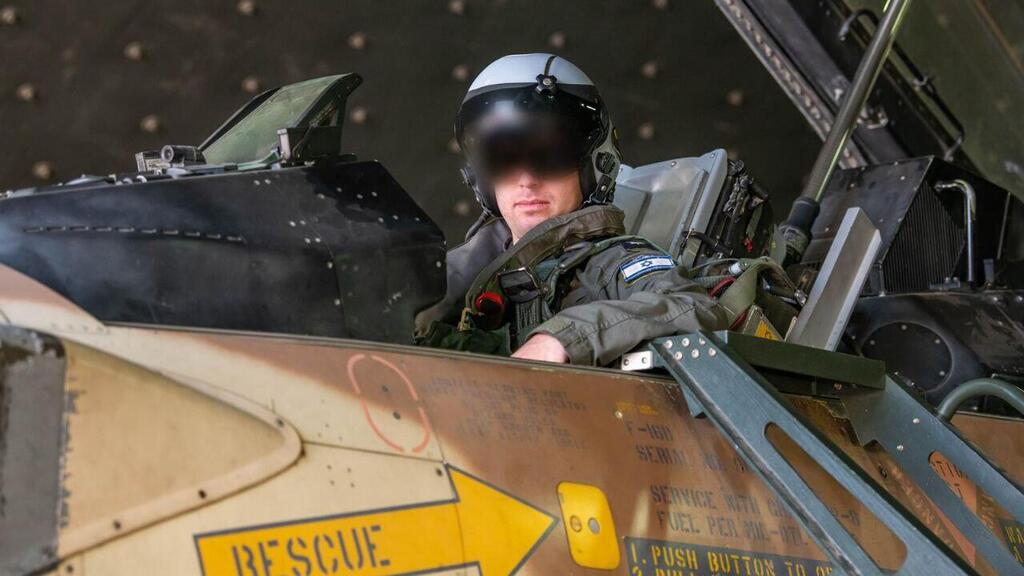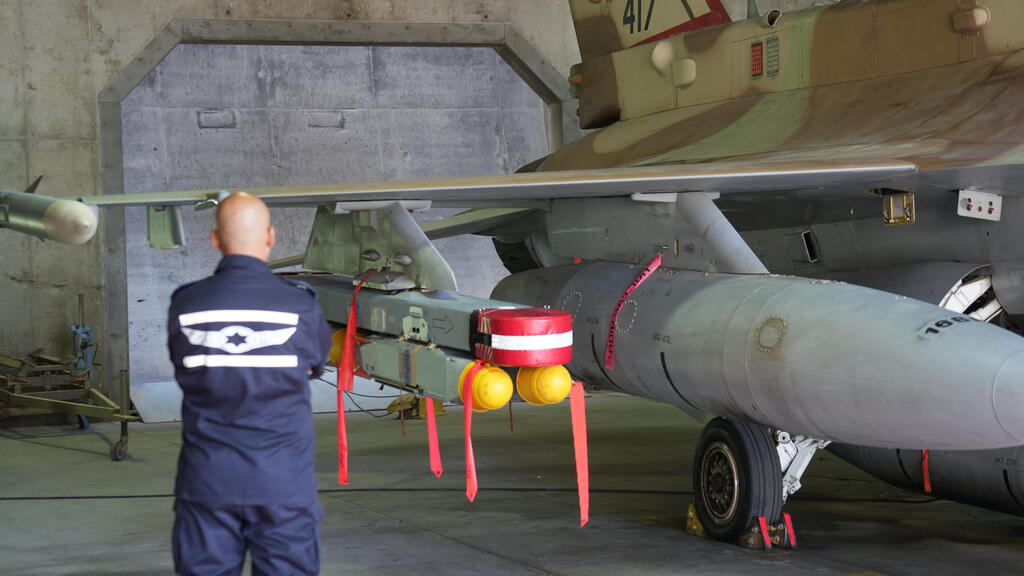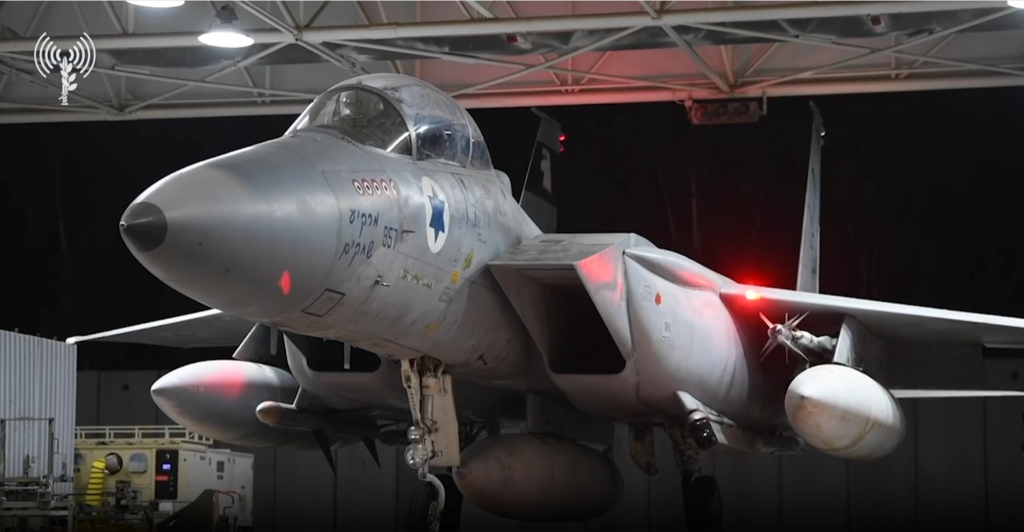Getting your Trinity Audio player ready...
"The entire operation went according to plan. We were deep in one of the deserts, the moon was rising, and you tell yourself, 'Here it begins.' It's an image I’ll carry with me for a long time," recounts Maj. N., a combat navigator, describing a mission over enemy territory en route to Iran for a retaliatory strike following Iran's massive early October attack. "After landing, it took me a moment to process and understand the full impact of what I’d done. Gaza is here; Lebanon is somewhat distant, but Iran — it's far, and we’re not normally there."
"The Air Force has been preparing for the eastern front for at least 20 years, as long as I can remember," Maj. N. says. "It's constantly on our radar. It's no secret that Iran is a relevant theater, always distant and unreachable, somewhere off in the distance. But we got there."
The planes taking off to strike in Iran
(Video: IDF)
In 119 Squadron, based at Ramon Airbase, the team meticulously prepared for the mission. "We were all here during the holiday," shared Maj. Anael from the base’s control tower. "On Friday, we started the day early with more drills and preparations, briefing soldiers with our commanders. We make sure to maintain unity beforehand, talking together about what we’re doing here, especially with the maneuvering and knowing we have hostages. I have a close friend, Omer Wenkert, who was abducted," she added (Wenket was abducted from the Re’im festival to Gaza). "Each time a plane takes off, I think of him and our friends fighting, and how we’re protecting them from above."
'Dad doesn't come back saying, "I bombed Iran"'
Maj. N. woke up to sirens in Jerusalem on the morning of October 7. By 8 a.m., he’d decided to head to the squadron, and by early afternoon he was already in the skies over Gaza. "The initial situation then and now is completely different," he reflects. "What happened surrounds all of us. We’re here around the clock. In the days leading up to the strike, we focused mainly on preparations: ground scenarios, studying the terrain and the air models, including scenarios and responses. We sit and think about what it means if there are surprises – in the plane, the systems, or the field itself.
"Of course, it crosses your mind – what happens if things don't go as planned. But once airborne there’s this heightened focus, and nothing else enters your mind. It’s full of data, figuring out how to execute the mission, and what to do at each stage. It’s an enormous privilege. We know it’s a historic event, that we're doing something unprecedented at this scale. From the moment you cross that flight line into enemy territory, all your senses sharpen. The alertness stays at that heightened level until we’re back in our country’s borders. Until you’re home, you’re alert, razor-sharp. After crossing back, you allow yourself to relax. Once we land, we gather information from our fellow squad members, realize it was a successful event, and there’s a great sense of satisfaction."
Maj. N., married with five children, didn’t tell his family the details of that night. "My wife hears the same news we all consume, so she can put two and two together. My family and friends understood quickly. They’d read about the increased intensity, the talk of things to come. My wife isn’t fazed by the distance I fly; it’s part of serving in the Air Force. Dad doesn’t come home saying, ‘I bombed Iran.’ They know enough. The kids are happy and proud."
'You feel a sense of duty as you take care of the skies'
"Most of our flights are operational. But a mission toward Iran is something different," Maj. Anael explained. "There are specific forms indicating the aircraft's destination. It’s knowing they’re going on a different mission. Just hearing that plane take off… and not everything always goes smoothly. We have to keep a safe and functional base for every departing plane and every plane returning safely. It’s very moving to say, ‘Cleared for takeoff,’ and send those planes so far away. We see where they’re heading, and we feel responsible for following them – who’s landing, who’s taking off, and how to take care of the skies. The feeling of knowing the planes completed the mission is incredible. It’s knowing we’re part of something historic. When we learned they’d launched and completed the offensive action, our pulse quickened, because it’s the riskiest moment for the pilots, seeing what the ‘red side’ has planned."
"The night didn’t end with the strike – it continued long after that," she added. Maj. R., head of the munitions division, shared his perspective: "The moment it ends, and everyone’s landed, we’re just waiting for the next mission. If you’d asked me a year ago if something like this would happen, I wouldn’t have believed it. In those first days of the war, we were in shock, not expecting this. The feelings were intense and stay with us. Some of the scenarios we prepared for — the reality has outpaced them all. I didn’t anticipate we’d reach where we have, but I trust the people and the machines. When it’s over, there’s a sigh of relief, and then you wait for the next mission. I feel the people of Israel are united. Our mission is to bring the hostages back, and that’s what drives our work."
"I’ll always remember the moon that night — it was a brilliant crescent, shining and rising just as we flew deep, illuminating the pitch-black night," recalls Maj. S., a combat pilot, speaking of the moment he flew over enemy skies. He came to Israel as a lone soldier and was part of Operation Days of Repentance against Iran. As a combat pilot, he keeps his focus short-term, always thinking ahead to the next sortie. But what doesn’t fade is the commitment to bring the hostages home and return civilians to their homes, whether in the north or Gaza perimeter.
"My family knows I was part of the attack, but the exact details — I still can’t share. It’s tough from a distance, and even for those whose parents are here, it’s difficult to talk about our experiences and what we’re doing. Here, I decided to share, and it’s very empowering. My parents were incredibly moved and proud," he said.
'We know how to strike far and under significant threats'
Maj. S. explained that, as a combat pilot, he has trained for such moments. "We were trained to strike deep in enemy territory. I know how to reach faraway countries under numerous threats. These are capabilities we trained for even before October 7. In the days leading up to the mission, the excitement grew, and there was a little pressure, too. The peak came just before takeoff. It comes from knowing the importance and meaning of what we're about to do, understanding how many people are counting on us. The squadron commander assigned me to the mission and trained me for it. In the end, it’s me carrying it out, and it has meaning for every citizen in the country. They might not know I’m the one executing it, but a single mission has strategic importance," he said.
"I believe the point isn’t just the specific target but that we’re delivering weaponry into Iran and showing them we have the capability. Look, we’ve reached you; we’re responding, we’re here. And on this mission, we dealt them a significant blow. It’s less about the target than the operation itself — I’m placing munitions on Iranian soil."
Despite the excitement and pressure, he says it dissipates once in the air. "The moment I power up the engines on the ground and take off," Maj. N. explained, "my body and mind go on autopilot. I’m skilled enough not to feel it, and the plane will do what’s required. I’ll always remember the moon that night. It was a brilliant, crescent moon, rising exactly as we flew deep, lighting the surrounding area and allowing me to see in a very dark night. I’m trained enough to separate emotions from actions in real time, making decisions quickly by working purely logically. After landing, it took me a moment to process and understand the full impact of what I’d done."
"This wasn’t the first time, and it won’t be the last that I put myself at risk in a combat mission," he said. "Even in more routine sorties during the war, I take risks. And if the enemy does its job well, there’s a chance I’ll be hit. It’s a fear I understand every time I take off. The best thing I can do is not think about it– fly fast, fly well, and if something happens, respond optimally. Because it was such a critical mission, we took risks – I knew there was a chance I’d be hit, but we had ample time to prepare for nearly every contingency, a 'what if' response. If the worst should happen, I’m mentally prepared and know what steps to take in each moment."
Despite the historic nature of the mission, he says he keeps his focus on the next assignment. "The moment I land, the focus is on debriefing and preparing for the next mission, and the next mission is always important. Even after returning from the strike in Iran, I flew several missions afterward, each with a different character and creating different feelings. The only things that don’t fade from memory are the commitment and importance of bringing the hostages home and returning our residents to their homes —whether in the north or the Gaza perimeter. We’re committed, and we can’t stop until everyone is back —every hostage, every resident."
Get the Ynetnews app on your smartphone:










